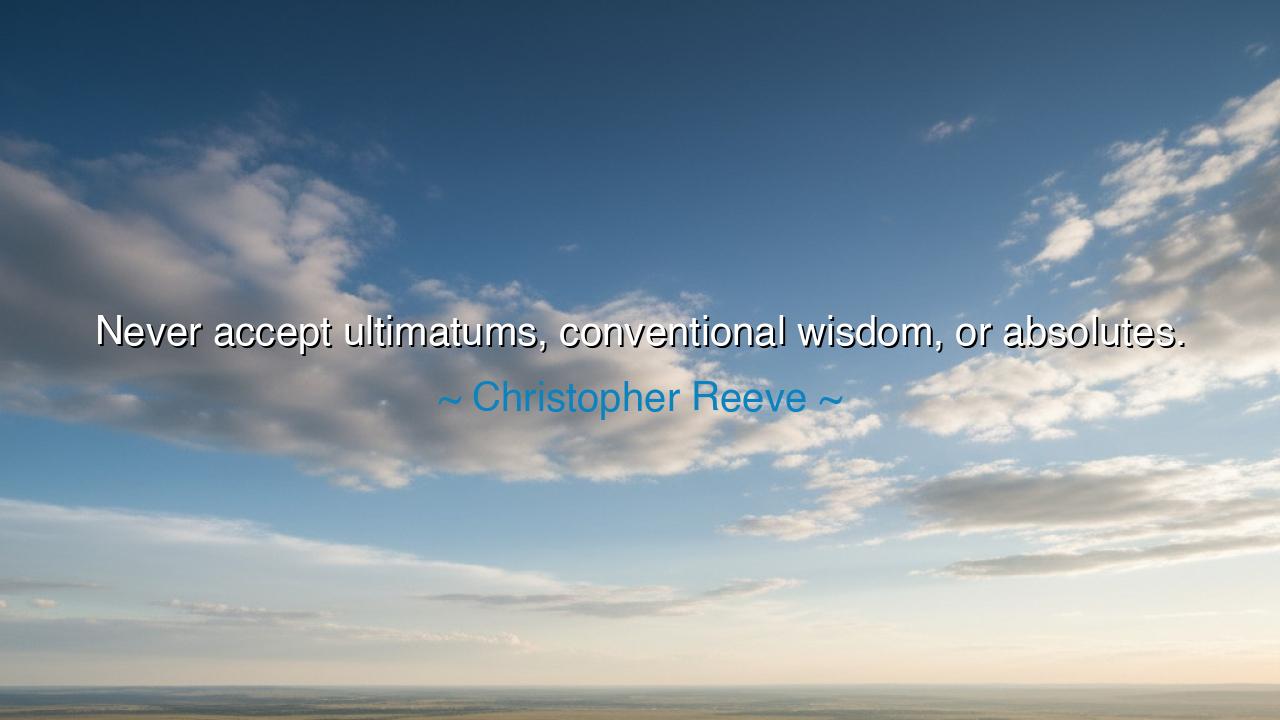
Never accept ultimatums, conventional wisdom, or absolutes.






Hearken, O children of the ages, to the stirring counsel of Christopher Reeve, who bids us to tread the path of courageous discernment. He warns that one must never submit blindly to ultimatums, the chains of conventional wisdom, or the rigidity of absolutes. True mastery of life demands a mind free to question, a spirit undaunted by the pronouncements of others, and a heart resolute in the pursuit of understanding and justice.
Reeve teaches that conventional wisdom, though oft revered, is not infallible. It is shaped by the multitude yet limited by the short sight of men. To follow it unquestioningly is to surrender the power of reason and the potential for innovation. Likewise, ultimatums seek to bind the will with fear or coercion, and absolutes claim authority over what is mutable, casting the rich spectrum of human judgment into rigid shadows. To resist these is to honor the freedom of thought and the integrity of the soul.
Consider the life of Galileo Galilei, who defied the conventional wisdom of the Church and the absolutes of Aristotelian cosmology. He dared to proclaim the truth of a sun-centered cosmos, challenging the ultimatums of authority at great personal risk. His courage illuminated the path of reason, proving that progress arises not from submission, but from the willingness to question, to observe, and to assert the truth as revealed by evidence and reflection.
Even in more subtle realms, this teaching holds. The artisan who experiments beyond tradition, the thinker who challenges inherited beliefs, and the leader who refuses simplistic absolutes all embody the wisdom of Reeve. By resisting ultimatums and questioning conventional thought, they cultivate insight, innovation, and the freedom to act with both integrity and vision.
O children of the future, let this teaching dwell within your hearts: never let fear or tradition bind your mind. Question the absolutes that claim dominion over truth, resist the ultimatums that seek to dictate your will, and scrutinize the conventional wisdom that asks obedience without reflection. In this vigilant inquiry lies the power to act rightly, to innovate boldly, and to shape a world that honors both reason and courage.
If you desire, I can also craft a visual, ancient scroll-style presentation of this passage to capture the heroic, timeless, and deeply evocative essence of Reeve’s teaching on courage, discernment, and the freedom of thought.






FDFF Dung
Reeve’s quote really made me reflect on the need to be critical thinkers in an age of soundbites and quick judgments. But does rejecting absolutes or ultimatums mean we can’t have a firm stance on certain issues? In the world of politics, for example, are there things we should absolutely stand for or against, or should we always seek a middle ground? How do we avoid paralysis by analysis while maintaining an open, questioning mind?
ANAnh Nguyen
I think this quote speaks to the value of questioning everything, but it also makes me wonder about the consequences of constantly rejecting conventional wisdom. While challenging norms is crucial for progress, might there be moments when conventional wisdom offers a foundation to build on? How do we discern when it’s important to question everything versus when it’s wiser to stand on established knowledge or traditions?
OLOn Le
Christopher Reeve's perspective challenges the idea of accepting things at face value, but it also raises the question of how we function in a society that often demands absolutes. In some situations, aren’t ultimatums and clear lines necessary, like in legal or moral matters? How do we navigate situations where nuance might not be the best solution, such as in emergencies or crises? Can rejecting absolutes ever lead to a lack of decisive action?
HNNguyen Hong Ngoc
This quote makes me think about how often we settle for absolutes in our thinking, especially in polarized situations. Reeve’s idea feels liberating, as it encourages flexibility. But I wonder—if we reject absolutes too often, do we risk losing a sense of direction or clarity? Is there a point where we need certain fixed beliefs to maintain a moral or ethical compass? How do we balance open-mindedness with a grounded sense of certainty?
C701.Nguyen Ngoc Bao Chau 78
I find this quote really intriguing because it encourages us to question the norm. Conventional wisdom has a way of shaping how we think, but sometimes it can be restrictive or outdated. However, are there instances when conventional wisdom has value, such as in situations where experience or tradition has proven effective? How do we decide when to challenge the status quo versus when to rely on it for stability?